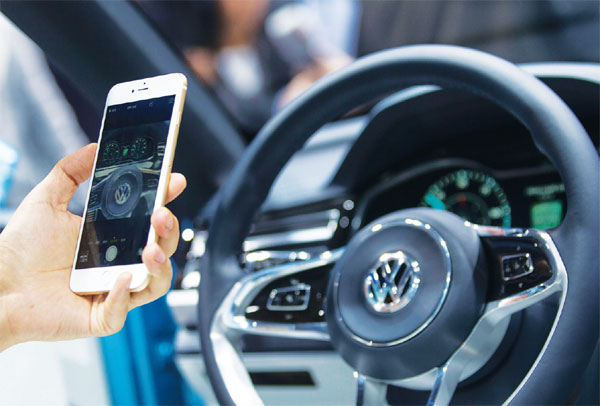Internet giants all in the driver's seat
Updated: 2015-04-09 07:32
By Cheng Yingqi(HK Edition)
|
|||||||||
|
Mainland Internet giants plan to enter the IoV (Internet of Vehicles) market and invest in developing smart electric vehicles. Andrew Harrer / Bloomberg |
In an age dominated by mobile Internet, the only occasions when someone is not hanging out online is probably when he or she is driving or sleeping.
Mainland Internet giants Tencent, Baidu and Alibaba are now trying to take care of people's driving hours.
Tencent Holdings Ltd, Foxconn Technology Group and China Harmony Auto Holding Limited signed a strategic cooperation framework agreement early this month to research and develop new products related to Internet and smart electric vehicles.
They will set up a professional team in Henan province, with Tencent taking charge of Internet platform construction, Foxconn sharing its core technology and experiences in battery production, advanced lightweight materials and the electronic control system, and China Harmony Auto Holding responsible for marketing.
However, with such a strong cast, Tencent is still a latecomer in the promising IoV (Internet of Vehicles) market, to which Internet giants have flocked to secure a vantage position since 2014.

In January this year, Baidu released CarLife, an IoV app that applies to both iOS and Android systems. Two months later, Alibaba announced a 1-billion-yuan ($161.44 million) IoV foundation together with SAIC Motor Corp Ltd.
"As is known to all, the automobile industry is a sunset industry. To explore new areas of growth, the industry has to be integrated with the new, powerful economic force like the Internet," said Zhang Zhaohu, editor of Quality Car magazine and a commentator with CNR.
The first step, as well as the easiest step, is to connect the cars' entertainment system with the Internet to increase driver-vehicle interaction, he said.
However, Zhang said there are still bottlenecks to overcome before the current IoV hardware system is developed on a large scale basis.
"Safety concerns come first. The IoV system increases the size of the console panel, like those on Nissan LEAF or on Tesla Model S, to make them look more like a Boeing aircraft's rather than traditional cars," Zhang said.
But, according to international safety standards, it's very dangerous if a driver gets distracted from the road for 2.1 seconds. So, we still need a technological breakthrough to solve this problem," he said.
Besides, the possibility of privacy being leaked during vehicle maintenance is also a key consideration if a driver uploads personal information like bank accounts onto the car's system.
Cost control, onto the other hand, is another major obstacle in the popularization of the IoV system.
"The IoV system is not likely to be popular unless electric vehicles are widely used because the mechanical power system, which is already costly, together with electronic IoV system, will increase the price of cars to a degree that most people cannot afford," Zhang warned.
"These problems need to be addressed through the joint efforts of the Internet giants and traditional automotive giants," he said.
The ultimate goal of the Internet giants that are scrambling into the IoV market, however, is much ambitious than just "installing a large iPad to cars", said Meng Wei, a hardware investor.
In general, Internet companies make money through advertisements, e-commerce and cyber games, which are more applicable to mobile phones than vehicles.
"The real goal of the IoV system is automated driving, and ultimately, redesigning the whole transportation system into a intelligent transportation system, which will create huge value for Internet players, even reshuffling the automobile industry," Meng said.
With an adequate number of autonomous vehicles running on the roads, the IoV system on each car can upload the location, route and speed onto a cloud, which will automatically optimize the car's driving parameters to avoid traffic jams.
However, there's still long way to go to reach that ideal future - some military technologies like radar and laser scanning have to be used in the cars' Obstacle Avoidance System.
There must not be any time delay or program crash with the IoV system; the communication system should be far better than those currently in use; and the cost should be reduced to a reasonable level, Meng said.
chengyingqi@chinadaily.com.cn
(HK Edition 04/09/2015 page8)
